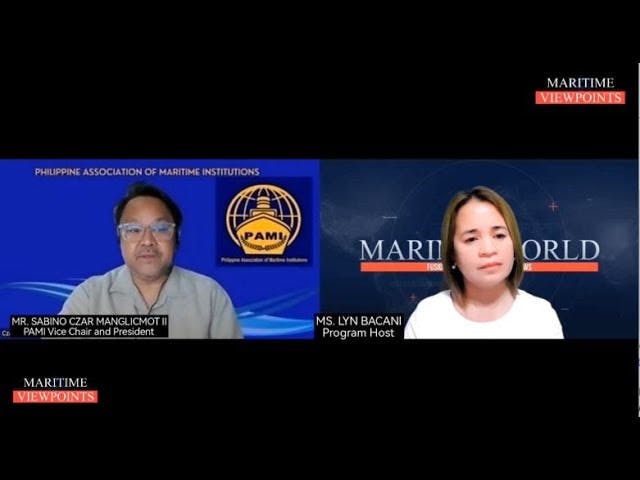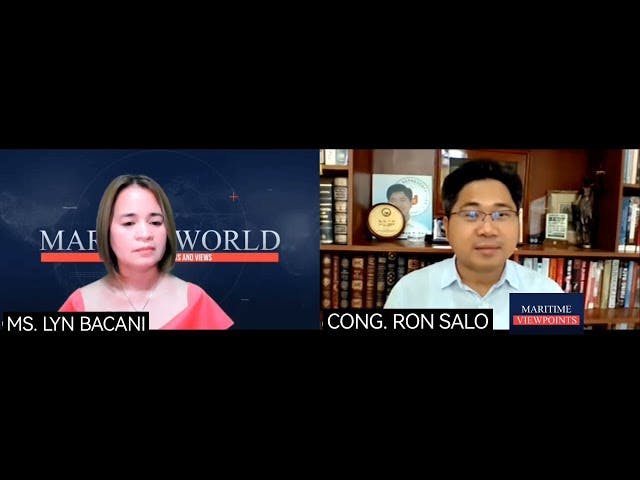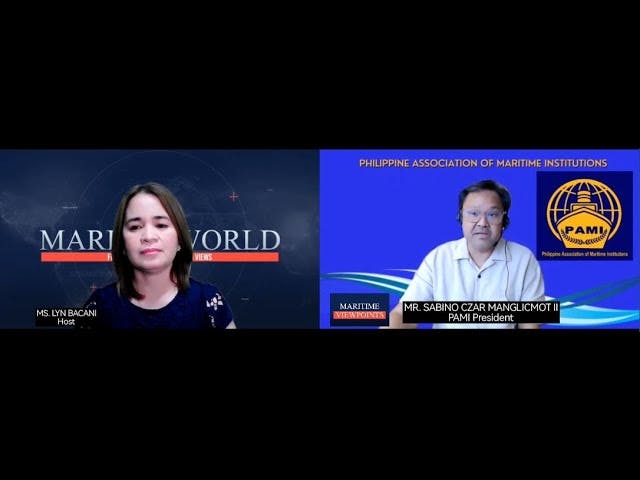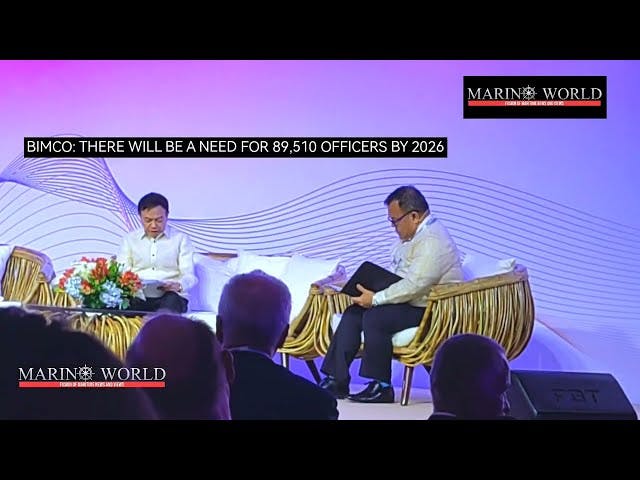NEWS

Argentina arrests Pinoy cook, probes 20 others after seizing nearly half-ton cocaine on ship
Argentina authorities arrested a Filipino cook after seizing 469,500 kilos of high-purity cocaine aboard the Marshall Islands-flagged bulk carrier CECI docked at the Vicentin company pier in San Lorenzo.
Media reports say the ship’s cook Jonathan Caputero, confessed to his role in the drug smuggling effort. The other 20 Filipino crew are also detained and under investigation. The ship’s captain reportedly alerted authorities after noticing suspicious bags in the vessel’s refrigeration chambers. The captain reportedly contacted the shipowner, who then relayed the information to the appropriate authorities.
The Customs Collection and Control Agency (ARCA) estimates the street value of the seized cocaine to be approximately $6 million in the large-scale drug trafficking market. Patricia Bullrich, the nation’s Security Minister, stated that the $6 million worth of drugs bricks will automatically increase to $20 million once they reach Europe.
Initial investigation revealed that the ship had traveled from Dubai, making a stop at Pontón Arrogante in international waters of the Río de la Plata before arriving in San Lorenzo. The ship was en route to the Netherlands with a declared cargo of sunflower pellets.
The cocaine was discovered in a refrigerator on the merchant ship CECI, specifically within a compartment containing food for the crew. Authorities noted that the packages were marked with images of crowns, suggesting a possible connection to a specific drug cartel.
This seizure highlights the ongoing challenges Argentina faces as a hotspot for international drug trafficking. The case also serves as a reminder of the “blind hook” contamination technique, which could indicate port security breaches or collusion.
The “blind hook” method is a technique used to introduce drugs into legitimate cargo. It involves breaking customs seals on containers, inserting the drugs, and resealing the containers with similar seals. While not explicitly mentioned in the initial reports of this specific seizure, the incident recalls a larger problem of drug smuggling within the Rosario region.

Coalition ask SC to declare Sec 59 of Magna Carta of Filipino Seafarers unconstitutional
The Concerned Seafarers of the Philippines (CSP) and International Seafarers Action Center (ISAC), backed by Bayan Muna, asked the Supreme Court yesterday, May 6, to declare unconstitutional Section 59 of the Republic Act 12021 or the Magna Carta of Filipino Seafarers (MCFS), which aims to crack down on ambulance chasers who prey on seafarers and discourage shipowners from hiring Filipino seafarers.
Counsel for the petitioners Atty. Neri Colmenares filed the petition challenging Section 59 of the law, which requires seafarers to post a bond in order to receive the full amount of compensation awarded to them by the NLRC arbiters or NCMB arbitrators.
The specific provision states that, “Pending an appeal or judicial review, a writ of execution on items any disputed amount determined to be legally due the seafarer, and the damages, including moral damages, exemplary damages, nominal damages, attorney’s fees and other similar awards shall only be issued if the judgment obligee posts a sufficient bond to ensure the full restitution of those amounts and the bond shall be maintained by the obligee until final resolution of the appeal or judicial review: Provided, That in the event the seafarer ultimately prevails on appeal or judicial review, the losing party shall immediately reimburse the total amount paid by the seafarer for the cost of the bond. However, if the seafarer loses, no such reimbursement shall be made.
“Under our current laws, compensation won by land-based workers in the Philippines are immediately accessible to the workers if they won their case in the DOLE and NLRC. Why the different treatment to sea-based workers like seafarers?,” Colmenares asked.
The petition also questioned the MCFS provision in Section 59 that uses the Aksyon Fund allocated to Department of Migrant Workers (DMW) in the GAA for OFWs, to pay the seafarers’ bond.
“The use of DMW Aksyon Fund violates the constitutional provision that public fund should be used for public purposes as the bond will ultimately benefit foreign ship owners or employers and not the seafarers. Further, this will take away much needed funds from our OFWs. Kaya wala naman talagang benepisyo ang paggamit ng Aksyon Fund kasi kukunin din lang yon sa pondo na para sa OFWs” Colmenares argued.
According to the MCFS “The DMW, through the Agarang Kalinga at Saklolo Para sa mga OFW na Nangangailangan (AKSYON Fund), may provide financial assistance to the seafarer depending on the final determination of maritime disability grading under Section 57 of this Act for the payment of premiums of the bond either in full or in part. Pertinent guidelines for assistance in the payment of premiums, including the availment process, amount, or length of validity shall be issued by DMW, after consultation with stakeholders, including the DOLE, NLRC, seafarers unions, manning agencies, shipowners, or their representatives.”

MARINA undergoes second independent evaluation of seafarer's identity document
The Maritime Industry Authority (MARINA) has formally commenced the Second Independent Evaluation (IE) of the Philippine Seafarer’s Identity Document (SID) in compliance with International Labour Organization (ILO) Convention No. 185 or the Seafarers’ Identity Documents Convention (Revised), 2003, as amended.
The evaluation, scheduled from 05 to 16 May 2025, is spearheaded by Dr. John William M. Campbell, an esteemed ILO Evaluator and global authority in International Labor Standards and Biometrics & Identity Management. The review encompasses a thorough assessment of the country’s SID issuance, authentication, and data protection systems to verify adherence to international security and identity verification protocols.
As part of the process, Dr. Campbell will conduct on-site audits at MARINA’s Regional Offices in Iloilo and Cebu, ensuring that field-level operations align with central system standards and international best practices.
In her welcome remarks, MARINA Administrator Sonia B. Malaluan emphasized the importance of the initiative:
“It is our responsibility to provide seafarers with secure, reliable, and globally recognized identity documents. This evaluation is a critical step in affirming and enhancing our systems to better serve Filipino seafarers and support their mobility across borders.”
Dr. Campbell acknowledged the agency’s continued advancements, stating:
“In 2019, I was deeply impressed by MARINA’s dedication and the robustness of its SID system—by far, the most secure and best implemented in the world. Today, I am equally impressed, particularly with the comprehensive documentation submitted in 2024.”
The Philippine SID, embedded with biometric and machine-readable features, is a vital travel document facilitating the smooth transit of Filipino seafarers through international ports and borders. The outcome of this independent evaluation is expected to reaffirm MARINA’s compliance with ILO C185 and bolster national efforts to safeguard and empower the Filipino maritime workforce.
Source: MARINA

New air pollution limits for ships enter into effect in the Mediterranean
The Mediterranean Sea officially became an Emission Control Area for Sulphur Oxides and Particulate Matter (Med SOx ECA) under MARPOL Annex VI on 1 May 2025. The sulphur content in fuel oil for ships operating in the area is now limited to 0.1%, significantly reducing air pollution and delivering major benefits to both human health and the marine environment.
Ships operating in Emission Control Areas for Sulphur Oxides and Particulate Matter, such as the Mediterranean Sea, are subject to strict mandatory measures to prevent, reduce and control air pollution. This new ECA must comply with stricter sulphur content limits than those set by the global standard (0.10% mass by mass (m/m), compared with 0.50% m/m allowed outside SOx ECAs).
Decreasing SOx emissions from shipping improves human health by lowering rates of lung cancer, cardiovascular disease, strokes and childhood asthma. The environment also benefits significantly, as reduced acidification helps protect crops, forests, and aquatic species. Finally, this measure is expected to reduce haze caused by ships, increasing visibility and decreasing the risk of maritime accidents.
The Mediterranean Sea is home to some of the busiest maritime routes in the world, supporting 20% of seaborne trade. It is estimated that more than 17% of worldwide cruises and 24% of the world fleet navigate the Mediterranean Sea.
The Med SOx ECA is the fifth designated Emission Control Area under MARPOL Annex VI, alongside the Baltic Sea area; the North Sea area; the North American area (covering designated coastal areas off the United States and Canada); and the United States Caribbean Sea ECA (around Puerto Rico and the United States Virgin Islands). In 2024, IMO designated two further ECAs: the Canadian Arctic and the Norwegian Sea. In April 2025, MEPC 83 approved a proposal to designate the North-East Atlantic as an Emission Control Area.
On 1 January 2020, new limits on sulphur content in fuel oil led to a 70% reduction in total sulphur oxide emissions from shipping by setting a maximum sulphur content of 0.5% outside the emission control areas.
DIGITAL EDITIONS
YOUTUBE VIDEOS
FEATURES

SEA ASIA: The definitive maritime industry gathering for business, innovation and collaboration
As the global maritime industry navigates an era of profound transformation, the highly anticipated Sea Asia 2025 returns to Singapore from March 25 to 27. Organised by Informa Markets and Singapore Maritime Foundation (SMF), 2025 marks the 10th biennial edition of the premier event with an expanded, more inclusive format designed to foster knowledge-sharing, partnerships, and innovation across the maritime value chain.
Marino World is a proud Media Partner of Sea Asia 2025.
With more than 20,000 attendees expected from more than 90 countries, 500 exhibitors and 100 international speakers, Sea Asia 2025 stands as the flagship event of the regional maritime calendar. In this milestone year, the event celebrates two decades of driving progress, and for the first time, the event’s conference access will be fully complimentary, enabling the global maritime and shipping community to participate freely in critical discussions shaping the industry's future.
This year’s conference agenda will tackle some of the most pressing issues impacting the global maritime and shipping industry, from navigating decarbonisation pathways and managing shifting trade patterns to embracing digital transformation and strengthening maritime security. Key speakers will include thought leaders from regulatory bodies, ship owners, technology innovators and sustainability experts, who will provide attendees with insightful perspectives into the evolving operating environment. 2025 speakers include C. K. Ong, President, U-Ming Marine Transportation Corporation; Sebastian Graf von Hardenberg, Chief Executive Officer, Bernhard Schulte Shipmanagement; Lionel Chatelet, Chief Commercial Officer, Pacific International Lines and many more.
In addition to a robust conference programme, Sea Asia 2025 offers a vibrant exhibition floor, featuring the Decarbonisation Solution Area and the Green Shipping Zone, highlighting cutting-edge technologies and strategies supporting the industry’s green transition. Attendees at Sea Asia 2025 can explore a diverse range of exhibitors from key sectors including shipyards, classification societies, equipment manufacturers, OEMs, and maritime technology providers. The well-established event will also host 13 country pavilions, including China, Cyprus, Denmark, France, Greece, Japan, Norway, Panama, Singapore, South Korea, the Netherlands, Turkey, and the United Kingdom, showcasing cutting-edge maritime solutions. As a prominent platform for the industry, Sea Asia 2025 will continue to facilitate knowledge exchange, foster international partnerships, and provide insights into emerging market opportunities.
Mr. Hor Weng Yew, Chairman of the Singapore Maritime Foundation said: “Sea Asia is a pivotal platform for the maritime community to exchange ideas, address industry challenges, and forge collaborative partnerships. In tandem with the industry’s transformation, Sea Asia 2025 has evolved to feature special zones reflecting the emerging trends and thought-provoking discussions on markets, green initiatives, and technological advancements.”
Mr. Sukumar Verma, Managing Director at Informa Markets Singapore, said: “Sea Asia has grown in both scale and significance since its inception, breaking records in international and overall participation – a testament to the dynamism of the maritime sector, Singapore’s strategic role as a global hub and the event itself. We intend to further enable industry by opening up access to world-leading thought leadership at our conference, with a view to help industry foster collaboration and evaluate strategic priorities.”
Sea Asia 2025 promises not just an exhibition, but a comprehensive and holistic experience where maritime professionals have the invaluable opportunity to evaluate innovative solutions, connect with industry leaders, and engage in meaningful conversations that will help chart the future of global shipping.
For more information on Sea Asia 2025, please visit https://www.sea-asia.com/

DMW supports Marino World Expo and BEACON
Migrant Workers Secretary Hans Leo Cacdac met with the organizers of the Marino World Manning Expo and Conference (MWMEC 2025) and The Maritime League’s Blue Economy Annual Trade and Conference (BEACON 2025) on Friday, March 14th.
The two major maritime events will take place simultaneously at the SMX Convention Center in Pasay City from September 29 to October 1, 2025, with the shared goal of advancing the maritime sector's interests.
Secretary Cacdac will be the Guest of Honor at the events’ joint opening ceremonies and he assured DMW's support for the undertakings, which will bring together seafarers and their families, shipowners and ship managers, maritime executives and staff, educators and trainers, government officials and employees, and service providers and suppliers to network, discuss and collaborate for the development and empowerment of our seafarers and the maritime industry.
The MWMEC also includes a job fair for DMW-accredited manning agencies. The conferences aim to address not only the lingering concerns but also the future challenges in the employment of our Filipino seafarers, anticipating the shipping’s huge transformation with the coming of new fuels, digitalization and automation.
The event will also feature products, services and activities for seafarers and their families.
Present at the meeting were Marino World Publisher Ms. Lyn Bacani, Senior Correspondents Gel and Onin Miranda, Maritime League Treasurer RAdm. Margarito Sanchez AFP (Ret), and BEACON sales and marketing manager Blanca Joy Bustamante.

AWA Marine and Wartsila support
Industry decarbonization and digitalization
AWA Marine and Wärtsilä hosted the 3rd Annual Simulation User Seminar held on November 13 at the luxurious Solaire Resort in Manila, themed “Decarbonization and Digitalization- Driving Change in Maritime Training,”
126 representatives from 60 education and training institutions, alongside key maritime industry stakeholders participated in the discussions and knowledge sharing.
Shayne Gent, AWA Marine General Manager, said the huge turnout shows a shared commitment to enhancing maritime training and education in the region.
Ben Chng, Wärtsilä Global Director of Sales, urged the attendees to support the crew's upskilling and transition to become better equipped on alternative fuel engines, new energy saving devices, and optimization tools.
“One of the key enablers for us to be successful in achieving this goal is really about collaboration across the eco system,” Chng pointed out.
So, at Wartsila, we believe we cannot do this alone, we have to do this with our partners, across the eco system. This means ourselves as suppliers, our local partners AWA Marine, the regulators, the government bodies, shipowners, ship managers and of course the training institutes, the instructors, seafaring crew community. All of us need to be part of this value chain.”
Education and Training.
Herbert Nalupa, Maritime Industry Authority (MARINA) STCW Office Maritime Education and Training Standards Supervisor (METSS) and concurrent Chief of Public Information Division and Monitoring discussed about the “Role of MARINA in the implementation of the STCW Convention in the Philippines,” while Felix Oca, Chairman of the Philippine Association of Maritime Institutions (PAMI) presented on the “Status of Maritime Higher Education in the Philippines.”
Nalupa said, “From the governments perspective, from the regulators perspective when we say transition to decarbonize industry the Philippines would have to think of seafarers.”
He explained, “It's all about how seafarers will be trained, educated on using alternative fuel, emerging technologies, new equipment onboard and new shipboard operations.”
There are currently 83 recognized MHEIs in the country. Oca discussed on the challenges encountered by MHEIS on implementing the changing curriculums.
He expects that with the emerging new technologies in global shipping, there will be additional knowledge, understanding, and proficiency (KUP) requirements in the curriculum.
STCW review
Neil Bennett, General Manager Sales, Global Simulation and Training, Wärtsilä Voyage, outlined the four objectives of the comprehensive review of the STCW Convention: continuing to deliver competent seafarers, providing internationally recognized standards, adapting to the industry’s new technologies and developments, and ensuring harmonized and consistent implementation.
He went on, “We’re trying very hard to make it easier to utilize simulators in your training and make it easier for flag states to be able to show that a simulator is “fix for purpose” or capable of being used for particular types of training, as part of “in-service training.”
There were 50 papers submitted by different countries and organization that identified around 400 gaps to be addressed in the ongoing comprehensive STCW review.
Nalupa confirmed, the Philippines submitted five papers for the proposed revisions, including reduction of the onboard training requirements, stating that “New and emerging technologies may support training and certification of seafarers. This could include the use of simulations as an alternative to a portion of a requirement for seagoing service. In addition, considering the initial phase, the training and certification of seafarers often precede the implementation or installation of these new technologies on ships.”
“Nowadays if we talk about education and training and implementation of seafarers building their competence either reskilling, either upskilling, we cannot do that without simulator, Nalupa said.
Expertise
Wärtsilä’s Sanjay Verma, General Manager, Business Development Decarbonization Services, and Sanjeev Thasari, TechSim Expert, Simulation Sales, shared their expertise on decarbonization and simulations.
Verma discussed how complex the decarbonization journey of the shipping industry and Wärtsilä’s initiatives to help achieve the net zero emission goals.
He underlined Wärtsilä’s approach to decarbonization of consuming less energy for the same work, and transforming the same energy more efficiently.
Furthermore, Sanjeev tackled Wärtsilä’s simulations and other platform solutions for the seafarers to “at least get the basic understanding of the new technologies and decarbonization concepts so that they can safely operate the ships when they are onboard.”
Other presenters at the seminar were Gaurav Bajaj, Product Lead of Wartsila Voyage Services
and Raimo Nikkila, Director of Sales and Business Development of Mevea Ltd.
Cooperation
AWA Marine Philippines Director and Chairman Liam Murphy and Business Development Manager Reynaldo Tanudtanud and Shiela Seno, Simulation Product Manager and Wärtsilä’s Kumar Kiran, Product Sales Manager Simulation were all present to strengthen cooperation with stakeholders.
The seminar concluded with a reception that provided an opportunity for casual networking with clients and guests.

Sea Quest Maritime Training
A STORY OF SYNERGY AND GROWTH
Sea Quest Maritime Training, Inc. (SQMTI) marks a new chapter of strategic acquisition in July 2024 geared towards promising enhanced services, broader reach, and a continued legacy of producing world-class seafarers.
This strategic move is not just a typical business acquisition but a synergy of expertise in systems and technology, licensing services, maritime training and assessment that set the stage for continued growth and innovation.
At the helm.
Seasoned businessman Mr. Joel Espineli, SQMTI new CEO and Chairman of the Board is concurrently the Chairman of Topmast, Inc. and Transhumance Maritime Services, Inc.
Topmast is a distributor of leading maritime training simulators leading modernization in maritime schools and training centers.
Transhumance specializes in licensing services, assisting Filipino seafarers with the complex process of certification and regulatory compliance, ensuring that they meet the international standards.
Espineli’s expertise in these areas made him a natural fit to take over Sea Quest to complement in achieving its core mission of providing world-class maritime training.
Teammates.
Espineli is joined on the Board by veteran C/E Mike Marasigan, who now serve as Chief Operating Officer (COO).
Marasigan has been a pillar of Sea Quest for many years bringing a wealth of knowledge in crewing and training. He has been instrumental in maintaining the high standards of SQMTI’s training programs. His years of experience with the institution ensure that the transition under new ownership is seamless, and his technical expertise provides continuity in program delivery.
Other members of the new SQMTI Board of Trustees include Mr. Marq Hernandez, Mr. Jeric Rebellion, Ms. Tin Gazo, Ms. Eden Llamas and Mr. Jay Dela Cruz.
Hernandez, as an IT expert and management specialist, will help streamline administrative processes, improve data management, and enhance communication systems within the organization. He could also introduce modern technologies such as learning management systems (LMS) to improve the delivery of training programs, making them more accessible and interactive for seafarers. His expertise can support the integration of simulation technologies and digital tools that could modernize maritime training, ensuring SQMTI remains competitive and forward-thinking.
Rebellion, a digital marketing specialist, adds a modern edge to the institution’s leadership. His expertise in digital marketing will be crucial for SQMTI to enhance its digital presence, making it easier for aspiring seafarers to access information, enroll in programs, and engage with the institution's services effectively.
Gazo, a seasoned expert in sales and marketing, will spearhead efforts to ensure that the SQMTI’s services are well-positioned in the competitive maritime training market. Her insights into market trends and client engagement will be essential for the growth of SQMTI.
Llamas, with her extensive knowledge of maritime licensing, ensures that Transhumance’ licensing services are seamlessly integrated into SQMTI’s training programs, offering seafarers a comprehensive solution that covers both training and certification. This integration simplifies the process for trainees and enhances the value of SQMTI’s services.
Dela Cruz, an experienced seafarer and educator, plays a critical role in shaping SQMTI’s curriculum. His hands-on experience at sea and his background in education ensure that the training programs remain relevant to the real-world challenges seafarers face, equipping them with the skills and knowledge they need to excel in their careers.
A hub for excellence.
SQMTI, located in the City of Manila, is a premier maritime assessment center that plays a critical role in the training and certification of seafarers.
With a mission to meet and exceed the requirements of the Standards of Training, Certification, and Watch-keeping (STCW) 1978, as amended, SQMTI is committed to the continuous improvement of its programs.
The institution actively collaborates with industry stakeholders through research, development, and peer review, ensuring that its curriculum evolves with the changing dynamics of the seafaring profession.
SQMTI provides Comprehensive Assessment Programs, that adhere to global standards and industry needs, including:
- Deck and Engine Officer-in-Charge and Management Level Practical Assessments,
- Electrotechnical Officers and Ratings, and
- Able Body Seafarer Engine and Engine Ratings.
Its state-of-the-art facilities are equipped with bridge and engine room simulators that replicate real-world maritime scenarios, offering hands-on training that prepare seafarers for the demands of their jobs.
SQMTI also boasts a team of highly qualified and experience instructors and assessors, ensuring seafarers receive effective, engaging training that meets the highest industry standards.
Expanding horizons.
The Team’s vision for SQMTI goes beyond simply meeting industry standards—they aim to position the institution as a leader in maritime education, continuously adapting to the evolving needs of the global maritime industry.
With state-of-the-art facilities, a commitment to excellence, and a comprehensive approach to seafarer development, SQMTI is poised to remain a vital player in ensuring the competence, professionalism, and safety of the maritime workforce.
The new Board of Directors’ acquisition of Sea Quest led by Chairman Espineli, is a well-strategized move that leverages each partner’s unique expertise.
Together, they are setting a new standard in maritime assessment, ensuring that Filipino seafarers continue to be among the most skilled and sought-after professionals in the global maritime industry.










